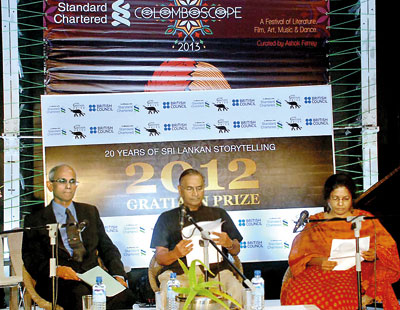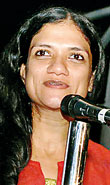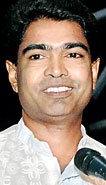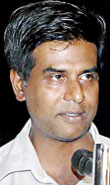Looking at literature in its socio-political context
View(s):The shortlist for the 2012 Gratiaen Prize
By Smriti Daniel
For most part it was an evening, as promised, of ‘incredibly short speeches’. Still, time all but crawled as the 59 Gratiaen hopefuls waited for the announcement of the shortlist on Friday March 22. When it did come, the list had its fair share of recognisable names, people like the prolific poet Malinda Seneviratne (here on the stage as a nominee for the 4th year running), playwright Ruwanthie de Chickera who was nominated for ‘Kalumaali’ along with her dear friend, the actress Nadie Kammallaweera and Lal Medawattegedera, himself no stranger to the Gratiaen shortlist, having been nominated in 2002 for ‘The Window Cleaner’s Soul’.

The panel of judges: (L-r) Lynn Ockersz, Jayantha Dhanapala and Sumathy Sivamohan. Pix by M.D. Nissanka
The first name to be announced was that of Rizvina Morseth de Alwis for the unpublished manuscript and the last that of Saroj Sinnetamby – neither new author was present. Rizvina’s sister delivered her thanks and Saroj had Colomboscope curator Ashok Ferrey explain that ‘The Professional’ had been 30 years in the making.
With novels, poetry and plays represented, the only genre that got short shrift were the short stories but the judges for the 2012 Gratiaen Prize were clearly spoilt for choice. In a speech that acknowledged the many challenges facing the panel, the chair of the panel Jayantha Dhanapala made only one general appeal – that future applicants make more assiduous use of spell check. The distinguished former career diplomat and current President of the Pugwash Conferences on Science and World Affairs was joined on the panel by Lynn Ockersz, a senior journalist, poet and lecturer in journalism, and Sumathy Sivamohan, writer, dramatist, filmmaker and academic, who is currently Head of the Department of English at the University of Peradeniya.
In a departure from previous years, the panel did not list their criteria for awarding the prizes, saying only: “To take the “literature around us” seriously in its socio-political context is precisely what we have endeavoured to do as judges. Writers do not function in a vacuum. They are witnesses to the society around them.”
The reference is to the author Michael Ondaatje, who once described his endowment of the prize as “an attempt on one level to share the wealth. I was lucky. But more important it is to celebrate and test and trust ourselves. To select and argue about the literature around us. To take it seriously, not just to see it as a jewel or a decoration.” It’s been 20 years since Ondaatje took his Booker Prize winnings for The English Patient and founded a prize in the name of his mother Doris Gratiaen. Its mandate? To nurture and cultivate Sri Lankan writing in English. In the past the Prize has been awarded to writers like Carl Muller, Sybil Wettasinghe, Nihal de Silva and Shehan Karunatilaka.
 Ruwanthie de Chickera |
 Lal Medawattegedera |
 Malinda Seneviratne |
That there were more submissions this year than the last is encouraging and it’s a trend the Trust hopes will continue. The announcement came within days of the release of last year’s winner, author Madhubhashini Disanayaka-Ratnayake’s novel ‘There’s Something I Have to Tell You’.
Madhubashini herself joined Ruwanthie, Malinda and 2011 nominee Mariam Reza on a panel on Sunday at Colomboscope to discuss their writing and the effect the prize had had on their careers. In a nutshell – the Gratiaen offers local writers recognition and motivation.
Organised in affiliation with the Standard Chartered Bank, the Gratiaen Prize and the HAI Goonetileke Prize for translation include a cash prize of Rs. 200,000 that are handed over to the winners upon the publication of their manuscripts. The winners of both awards will be announced on May 4, 2013 at 6.30 p.m. at Park Street Mews.
Judges’ verdict
Rizvina Morseth de Alwis – ‘It’s Not in the Stars’
At one level, this lucidly written, wide-ranging and engaging novel could be considered a chronicling of the key socio-political developments of post July 1983 Sri Lanka, but it is much more than that. It is also an insightful rendering of the distressing impact the seminal events of contemporary Sri Lanka have had on its many communities. Besides, it impresses on the reader that although ‘ethnicity’ entered the lexicon of Sri Lankans in a major way in 1983, with a huge divisive impact, love and affection formed particularly among the younger members of these communities endure over the decades, indicating a triumph of human values over what may be considered the vicissitudes of life and history. The writer makes her characters and the lives they lead come alive vibrantly in the mind’s eye of the reader and relates these in the most implicit of fashions to the major public events of the times, in a non-schematic, creative way. Several intertwining family ‘histories’ combine to form a colourful mosaic of lived experience.
Ruwanthie de Chickera and Nadie Kammallaweera – ‘Kalumaali’
An innovatively structured play which, while being described as “a fairy tale for grown-ups”, works at the level of magical story for children and as powerful theatre for adults exploring the identity crisis of a working woman and a mother. The interplay between reality and the imaginary world conjured up by the Kalumaali story, told and retold by different characters with different nuances, maintains the dramatic tension and tautness of the script. There is a rich use of dramatic symbolism, lyrical passages and a visualization of domestic chores and social pressures competing with the world of a professional journalist in this multi-layered play which has English and Sinhala texts juxtaposed.
Lal Medawattegedera – ‘Playing Pillow Politics At Mgk’
A thematically and formally innovative work mixing realism with the allegorical. It provides a daring perspective on contemporary urban, social and political realities, through the charting of the lives of working class protagonists in a time of turbulence and change. The language is racy and colloquial while its protagonists live out their lives within the immediate and the intimate, working through stories of love, infatuations, nostalgia and loss. There is magic, there is belief; there is scepticism, there is innocence; cunning and at the same time caring; triumph and defeat. The work is textured and layered with a multiplicity of characters, narratives, perspectives and trajectories. They are held together in a unity of storytelling underscored not by harmony but by contention and contradiction.
Malinda Seneviratne – ‘Open Words Are For Love-Letting’
If love is about relationships the demonstration of such love is an engagement with living understood as an intensity of feeling. Love is a motif for making connections with the immediacies of the world around one. An engaging collection of poetry that demonstrates poetry as a word-scape, patterns of tone and images of sound. The tones are muted and at the same time, intense, felt as well as reflective. These are poems that are nuanced for the most part, capturing the strength of feeling of felt moments of loss, death, growing, depicting an observant eye in all of them. It is not just a compelling read but a touching one as well
Saroj Sinnetamby – ‘The Professional’
This is a highly engrossing, imaginatively presented novel, focusing, among other things, on the hard choices confronting down-at-heel migrants from mainly the Third World in the impersonal ‘Big Cities’ of the First World. The chief character of the novel, a young Sri Lankan, is forced by circumstances to live by his wits in London but what gives the novel exceptional thematic substance is its essential affirmation of human values, through the occasional but intense emotional conflicts within the character. An interesting structural feature of this work is the telescoping within it, in the most unobtrusive, uncontrived fashion, of the present and the past of the protagonist.
Follow @timesonlinelk
comments powered by Disqus
















